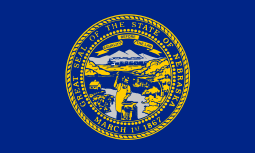Nebraska Cornhuskers
| Nebraska Cornhuskers | |
|---|---|
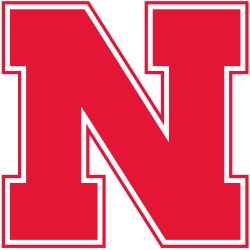 | |
| University | University of Nebraska |
| Conference | Big Ten |
| NCAA | Division I/FBS |
| Athletic director | Bill Moos |
| Location | Lincoln, Nebraska |
| Varsity teams | 22 |
| Football stadium | Memorial Stadium |
| Basketball arena | Pinnacle Bank Arena |
| Ice hockey arena | John Breslow Ice Center |
| Baseball stadium | Hawks Field |
| Softball stadium | Bowlin Stadium |
| Soccer stadium | Barbara Hibner Stadium |
| Lacrosse stadium |
Cook Pavilion Vine Outdoor Complex |
| Other arenas |
Devaney Center Nebraska Coliseum Ed Weir Stadium |
| Mascot |
Herbie Husker Lil' Red |
| Nickname |
Cornhuskers Big Red |
| Fight song | Hail Varsity |
| Colors |
Scarlet and Cream[1] |
| Website |
www |

The Nebraska Cornhuskers (often abbreviated to Huskers) are the intercollegiate athletic teams that represent the University of Nebraska–Lincoln. The university is a member of the Big Ten Conference and the Cornhuskers compete in NCAA Division I, fielding 22 varsity teams (9 men's, 13 women's) in 15 sports. Nineteen of these teams participate the Big Ten, while rifle is a member of the single-sport Great America Rifle Conference and beach volleyball and bowling compete as independents.
Early nicknames for the university's athletic teams included the Hawkeyes (now associated with the University of Iowa), the Antelopes (later adopted by the University of Nebraska at Kearney), the Old Gold Knights, the Bugeaters, and the Mankilling Mastodons. Cornhuskers first appeared in a school newspaper headline ("We Have Met The Cornhuskers And They Are Ours"), after a 20–18 upset victory over Iowa in 1893. In this instance, Cornhuskers was used to refer to Iowa.[2][3][4] The first time the name was applied to Nebraska was in 1899, when Nebraska State Journal writer Cy Sherman, who would later help originate the AP Poll, began referring to Nebraska's football team as the Cornhuskers. The next year, the nickname was officially adopted by the school.[5][6][7]
For nearly 100 years, the Cornhuskers participated in the Big Eight Conference (previously known as the Missouri Valley Intercollegiate Athletic Association, the Big Six, and the Big Seven), and later for 15 years in the Big 12 Conference, which was formed when the Big Eight merged with four members of the defunct Southwest Conference. Nebraska joined the Big Ten in 2011.
The Cornhuskers have two official mascots, Herbie Husker and Lil' Red.
Fall varsity sports
| Men's sports | Women's sports |
|---|---|
| Baseball | Basketball |
| Basketball | Beach volleyball |
| Cross country | Bowling |
| Football | Cross country |
| Golf | Golf |
| Gymnastics | Gymnastics |
| Tennis | Rifle |
| Track & field† | Soccer |
| Wrestling | Softball |
| Swimming & diving | |
| Tennis | |
| Track & field† | |
| Volleyball | |
| † – Track and field includes both indoor and outdoor. | |
Cross country
The Nebraska Cornhuskers field men's and women's cross country teams, both of which have been coached by David Harris since 2012. They currently run on a course through Pioneer's Park in Lincoln. The men's team was founded in 1938 and the women's team in 1975, to help satisfy Title IX requirements.
Men
- Conference championships (1): 1940
Women
- Conference championships (5): 1985, 1988, 1989, 1991, 1993
Football
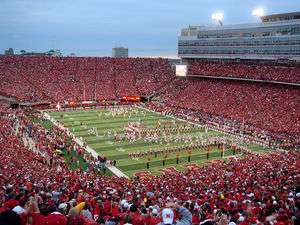
The Husker football team began competitive play in 1890, and since then has won 46 conference championships and claims five national championships:[8] 1970, 1971, 1994, 1995, and 1997. The latter three titles mark one of only three times that a team has won three national championships in a four-year span. The other two instances were Notre Dame in 1946, 1947 and 1949 and Alabama in 2009, 2011 and 2012. Despite not winning a conference title since 1999, Nebraska has won the most games of any program over the last 50 years.
The winningest head coach in school history is Tom Osborne, who led the team for from 1973 to 1997 and, with a record of 255–49–3, has the third-highest winning percentage of any coach at a major school in modern college football history. Osborne coached the Cornhuskers to three national titles (plus two others as a coordinator), including one in his final season.
After Osborne retired following the 1998 Orange Bowl, he selected Frank Solich as his successor. Solich led Nebraska to a conference title in 1999 and a national championship appearance in 2001. Under Solich's guidance, quarterback Eric Crouch won the Heisman Trophy in 2001. However, Solich was fired after going 16-10 in 2002 and 2003.
After firing Solich, athletic director Steve Pederson embarked on a 40-day coaching search that culminated in the hire of former Oakland Raiders coach Bill Callahan. Callahan represented a break from school tradition in that he primarily ran a pass-heavy West Coast offense, which starkly contrasted with the run-dominant I-form offense Nebraska had used for the previous 50 years. In 2004, Callahan led the Huskers to their first sub-.500 season since 1961, and after another five-win season in 2007, Callahan and Pederson were both dismissed.
On December 2, 2007, newly hired athletic director Tom Osborne named Bo Pelini head coach, although Pelini remained at LSU to coach in the national championship game, a 38-24 victory for the Tigers over Ohio State. Pelini had previously been the defensive coordinator at Nebraska in 2003 and was the school's interim head coach for the 2003 Alamo Bowl. Pelini compiled a record of 39–16 in his first four years as head coach, including bowl victories in the 2009 Gator Bowl over Clemson and the 2009 Holiday Bowl over Arizona. The latter of these games gave Nebraska its first bowl shutout in school history.
Following the 2014 season, athletic director Shawn Eichorst fired Pelini and quickly hired veteran coach Mike Riley from Oregon State. The first year under Riley was a disaster, as Nebraska went 5–7 and only made a bowl game due to strong academic performance and the lack of bowl-eligible teams across the country. In 2016, the Cornhuskers started 7–0 before an overtime loss to Wisconsin and a blowout loss to Ohio State knocked the team out of major bowl consideration. Nebraska went 4-8 in 2017 in perhaps the worst season in school history, and Riley and Eichorst were both fired.
On December 2, 2017, athletic director Bill Moos hired former Nebraska quarterback Scott Frost as head coach.
Nebraska notched its 800th win on October 14, 2006 with a 21–3 victory over Kansas State. The Cornhuskers rank third all-time in total wins, behind only Michigan and Texas.
When the Cornhuskers play at home in Memorial Stadium, the stadium holds more people than the town of Bellevue, the third-largest city in Nebraska. The stadium's attendance record was set on Saturday, September 20, 2014, when 91,585 people watched the Cornhuskers beat Miami. Entering the 2018 season, Memorial Stadium has been sold out for an NCAA-record 361 consecutive games, a streak that dates back to November 3, 1962. Nebraska is 305-56 in those games.
- Conference championships (46): 1894, 1895, 1897, 1907, 1910–17, 1921–23, 1928, 1929, 1931–33, 1935–37, 1940, 1963-66, 1969–72, 1975, 1978, 1981–84, 1988, 1991–95, 1997, 1999
- Division championships (10): 1996, 1997, 1999–2001, 2006, 2008–10, 2012
- National championships (claimed in bold) (14): 1915, 1921, 1970, 1971, 1980–84, 1993, 1994, 1995, 1997, 1999
Women's soccer
In 1995, Nebraska became the first school in the Big Eight to create a varsity women's soccer program. John Walker was hired lead the new program and took his team to the NCAA tournament in only his third year. Nebraska made the tournament in the next eight seasons, not missing again until 2006. The team has reached the Sweet 16 eight times and the Elite Eight twice. Walker has earned NSCAA National Coach of the Year, NSCAA Central Region Coach of the Year and Big 12 Conference Coach of the Year during his tenure in Lincoln. As of the 2018 season, the Huskers' (and Walker's) all-time record is 318–151–39 (.664).
- Conference championships (4): 1996, 1999, 2000, 2013
- Conference tournament championships (6): 1996, 1998–2000, 2002, 2013
- NCAA Tournament appearances (11): 1996–2005, 2013
Volleyball
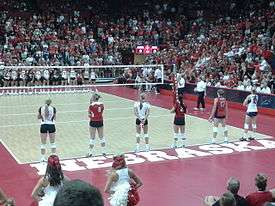
Nebraska is home to one of the most storied programs in women's volleyball. Nebraska volleyball has won five NCAA national championships (1995, 2000, 2006, 2015, 2017) and reached the national semifinals on nine other occasions. The program has won more games than any other in all of college volleyball, and is second behind only Stanford in terms of national semifinal appearances, NCAA tournament wins, and NCAA tournament winning percentage. Nebraska has made the NCAA tournament in every year of the its existence except for 1981, the first year of the tournament. Nebraska has featured moreAVCA All-Americans than any other program and has produced four AVCA National Player of the Year award winners. Nebraska, Penn State, and Texas are the only three programs not on the west coast to have won a women's volleyball national title.[9]
Nebraska volleyball is one of the most popular spectator attractions in the state. In 2008, AVCA executive director Kathy DeBoer described Nebraska as "the epicenter of volleyball fandom". The Cornhuskers have led the country in attendance every year since moving to the Devaney Center and have sold out over 200 straight home matches, an NCAA record for any women's sport.
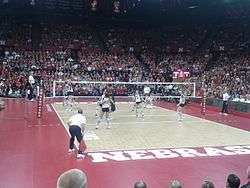
Nebraska has played in eight of the ten highest-attended volleyball games ever, with four of these taking place in the NCAA tournament at the CenturyLink Center in Omaha. On December 16, 2017, 18,516 fans watched Nebraska defeat Florida 3-1 in the national championship match at the Sprint Center in Kansas City. This broke the all-time attendance record that had been set just two days before, when Nebraska beat Penn State 3-2 in the national semifinals.[10] The Huskers also have the ongoing NCAA record for consecutive home sellouts in a women's sport at the Nebraska Coliseum in Lincoln.[11]
The 4,030-seat Nebraska Coliseum (now used only for wrestling) is one of few collegiate arenas designed specifically for volleyball. It has been described as 'the arena that the volleyball gods would build', and has drawn comparisons to Duke's Cameron Indoor Stadium due to its classical design, deafening acoustics, and intimate atmosphere. It was the subject of a CBS Sports documentary in 2009.[12]
The Coliseum provided Nebraska with an unparalleled home-court advantage. While playing there, the Cornhuskers had 15 undefeated seasons at home, compiling an all-time record of 454–30 (.938) under its roof. This stretch of excellence continued when Nebraska moved to the larger Devaney Center in 2014. From 2005 to 2009, Nebraska won 90 consecutive home games to set an NCAA volleyball record.
- Conference championships (34): 1976–92, 1994–96, 1998–2002, 2004–08, 2010, 2011, 2016, 2017
- Conference tournament championships (Big Eight only) (18): 1976–86, 1988–91, 1993–95
- AIAW (7) / NCAA (35) Tournament appearances: 1975–81, 1983–2017
- NCAA Tournament national semifinals (14): 1986, 1989, 1990, 1995, 1996, 1998, 2000, 2001, 2005, 2006, 2008, 2015–17
- NCAA Tournament championships (5): 1995, 2000, 2006, 2015, 2017
Winter varsity sports
Men's basketball
Most of the University of Nebraska's athletic programs have seen large amounts of continued success, but men's basketball has been an exception, accomplishing little of note since the establishment of the NCAA Tournament in 1939. Nebraska has not won a conference championship since sharing the Big Seven title with Kansas and Kansas State in 1950, and has not won the conference outright since going a perfect 12–0 in the Missouri Valley in 1916. Nebraska's lengthiest period of sustained success came in the first years of the sport's existence. The retroactive Premo-Porretta Power Poll ranked the Cornhuskers no. 8 nationally in 1897, no. 15 in 1898, no. 3 in 1899, no. 2 in 1900, no. 19 in 1903, no. 18 in 1904, no. 19 in 1905, and no. 16 in 1906.[13]
Nebraska is the only power conference program to never to win a game in the NCAA Tournament. In fact, the first tournament trip for the Cornhuskers did not come until 1986, 46 years after the tournament began. Much of the team's success came during the tenure of Danny Nee, who coached the Huskers from 1987 to 2000. Nee is the team's all-time winningest head coach, with an overall record of 254–190. Nee led Nebraska to five of its six NCAA Tournament appearances, as well as six appearances in the National Invitation Tournament, winning the NIT in 1996.
Tim Miles was hired on March 24, 2012 to replace the fired Doc Sadler as Nebraska's head coach. Miles led the Huskers to a surprise NCAA tournament trip in 2014, but has not been back to the NCAA or NIT tournament since.
- Conference championships (6): 1912–14, 1916, 1949, 1950
- Conference tournament championships (1): 1994
- NCAA Tournament appearances (7): 1986, 1991–94, 1998, 2014
- NIT appearances (17): 1967, 1978, 1980, 1983–85, 1987, 1989, 1995–97, 1999, 2004, 2006, 2008, 2009, 2011
- NIT championships (1): 1996
Women's basketball
Nebraska's women's basketball program started as a club sport in 1970 and became a varsity sport five years later. George Nicodemus was the first head coach, leading the Huskers to a 22–9 record and the second round of the AIAW Tournament in his first season. Nicodemus left the program in 1971, and the school cycled through head coaches before hiring Angela Beck in 1986. Beck led the Huskers to the Big Eight championship and the school's first NCAA Tournament appearance in 1988. She took the Huskers back to the NCAA Tournament in 1993 and 1996, but left the program after 1997 to pursue other opportunities. Beck's replacement was Paul Sanderford, who led Nebraska the tournament in his first three seasons. When Sanderford resigned in 2002 due to health issues, the school hired Creighton head coach Connie Yori. Under Yori's guidance, Nebraska became a fixture in the national top 25 and NCAA Tournament. In 2010, the Cornhuskers went 32-2, earned a number one seed in the NCAA Tournament, and reached the Sweet 16 for the first time in school history. Yori resigned in 2016 after a controversial investigation led by athletic director Shawn Eichorst concluded Yori had mistreated her players and assistant coaches. On April 11, 2016, former Huskers point guard Amy Williams was named Yori's replacement.
- Conference championships (2): 1988, 2010
- Conference tournament championships (1): 2014
- AIAW/NCAA Tournament appearances (16): 1979–81, 1988, 1993, 1996, 1998–2000, 2007, 2008, 2010, 2012–15
- WNIT appearances (4): 2004–06, 2009
Bowling
Bowling has been an official varsity sport at Nebraska since 1996. Prior to this, the club program won IBC national titles in 1991 and 1995. Bill Straub, who had also coached the club team, was hired to lead the varsity program and took the team to three more IBC titles, in 1997, 1999, and 2001. In 2003, the NCAA created a women's bowling tournament and the Huskers won the first two national titles. Nebraska has won three more titles since, and has never been ranked outside the top ten since national collegiate rankings debuted in 1990.
Bowling competes as an independent, making it one of only three programs at Nebraska not affiliated with the Big Ten.
- IBC (13) / NCAA (15) Tournament appearances: 1991–2018
- IBC (2) / NCAA (8) national championships: 1991, 1995, 1997, 1999, 2001, 2004, 2005, 2009, 2013, 2015
Men's gymnastics
Nebraska's men's gymnastics program is one of the most successful in the nation, with eight team national championships and 41 NCAA event titles. Ten Huskers have represented the United States in the Olympics. Nebraska is one of only seven Big Ten schools to sanction a men's gymnastics program.
Individual
- All-around national championships (9): Jim Hartung (1980, 1981), Wes Suter (1985), Tom Schlesinger (1987), Kevin Davis (1988), Patrick Kirksey (1989), Dennis Harrison (1994), Richard Grace (1995), Jason Hardabura (1999)
Team
- Conference championships (15): 1964, 1976, 1980, 1982, 1983, 1985, 1986, 1988–90, 1992–94, 1997, 1999
- NCAA championships (8): 1979–83, 1988, 1990, 1994
Women's gymnastics
Nebraska's women's gymnastics program was established in 1975. The school's first team, led by head coach Karen Balke, was composed entirely of freshmen and sophomores. Balke left after only two seasons, and Judy Schalk was named head coach. Schalk left after coaching the Huskers to five conference titles and a national tournament bid. Rick Walton replaced Schalk and gave the school its first NCAA event title when Michele Bryant won the vault in 1983. He captured four straight Big Eight championships, each resulting in an NCAA Tournament appearance. After the 1993 season, Walton left and Dan Kendig was named head coach. In his first year, he was named the conference coach of the year after leading the Huskers to the Big Eight title. In 1997, Nebraska upset no. 1 Utah to reach the Super Six Finals for the first time in school history. Kendig won his sixth consecutive conference championship in 1999 and was named national coach of the year. Kendig's team has won four individual event titles when Heather Brink won two NCAA event titles in all around and vault in 2000 and Richelle Simpson won the all around title and the floor exercise title in 2003. To date, Nebraska has never had a losing season.
Individual
- All-around national championships (2): Heather Brink (2000), Richelle Simpson (2003)
Team
- Conference championships (1): 2014
- Conference meet championships (23): 1978–80, 1982, 1983, 1987–90, 1994–99, 2001–03, 2005, 2007, 2011–13
- NCAA Tournament appearances (23) 1982, 1983, 1987–90, 1995–97, 1999–2007, 2010–12, 2014, 2015
Rifle
Rifle is classified as a co-ed sport by the NCAA, but Nebraska has always composed its team solely of women. Rifle got its start as an official sport at the university in 1998. The team practices and hosts meets at the 10-point indoor firing range located in the Military and Naval Sciences Building (ROTC).
Rifle competes in the Great America Rifle Conference, making it one of only three programs at Nebraska not affiliated with the Big Ten.
- Conference championships (1): 2006
- Conference tournament championships (2): 2005, 2006
- NCAA Tournament appearances (13): 2000, 2001, 2004–08, 2010, 2013–17
Men's track and field
Nebraska's men's track and field team started in 1922 under coach Henry Schulte, who led the Huskers to nine conference titles before his retirement. His assistant, college football Hall of Famer Ed Weir, replaced Schulte and won five conference titles before becoming an assistant athletic director. Jerry Lee led the team for a single season before Frank Sevigne took over the program in 1956. Under Sevigne, the Huskers won 11 individual national championships, with 42 All-American athletes and 103 individual conference champions in combined indoor and outdoor events. After Sevigne retired in 1983, Gary Pepin took over the program and currently coaches both the men's and women's teams.
Indoor track and field is a winter sport, while outdoor is a spring sport.
Indoor
- Conference championships (37): 1930–33, 1936–38, 1940–42, 1949, 1951, 1963, 1972, 1973, 1978, 1985, 1987–89, 1992, 1994–98, 2000–05, 2007, 2015, 2016
Outdoor
- Conference championships (29): 1921–24, 1926, 1929, 1932, 1933, 1936, 1937, 1939–42, 1950, 1966, 1987, 1989, 1990, 1995, 1996, 1998, 2000, 2002, 2004, 2009, 2010, 2013, 2016
Women's track and field
Nebraska's women's track and field program was created during the 1975–76 academic year and began competition in 1976. The team's first head coach was Roger Capan, but he left after only one season at the school and was replaced by Carol Frost, whose son Scott would later quarterback the Cornhuskers to a national championship in 1997. Frost left Nebraska after the 1980 season, and Gary Pepin took over the program. Two years later Pepin assumed control of the men's program as well, a dual role he still holds.
Indoor track and field is a winter sport, while outdoor is a spring sport.
Indoor
- Conference championships (24): 1980–97, 2000, 2001, 2004, 2005, 2011, 2012
- AIAW (1) / NCAA (2) national championships: 1982–84
Outdoor
- Conference championships (18): 1980–95, 2000, 2005
Wrestling
Nebraska's wrestling program started over 100 years ago and is one of the most storied programs in collegiate wrestling. The school's first official team began competition in 1910 under the guidance of head coach R.G. Clapp. Current head coach Mark Manning has led the Huskers for 18 seasons and twice won conference coach of the year.[14] Former Nebraska standouts include 2000 Olympic gold medalist and 2004 bronze medalist Rulon Gardner, and two-time NCAA champion Jordan Burroughs, who won the 2011 Freestyle World Championships Istanbul. Burroughs later won gold at the 2012 Olympic Games in London.
Individual
- National championships (11): Mike Nissen (1963– 123 lbs), Jim Scherr (1984– 177 lbs), Bill Scherr (1984– 190 lbs), Jason Kelber (1991– 126 lbs), Tony Purler (1993– 126 lbs), Tolly Thompson (1995– HWT), Brad Vering (2000– 197 lbs), Jason Powell (2004– 125 lbs), Paul Donahoe (2007– 125 lbs), Jordan Burroughs (2009– 157 lbs; 2011– 165 lbs)
Team
- Conference championships (7): 1911, 1915, 1924, 1949, 1993, 1995, 2009
Spring varsity sports
Baseball

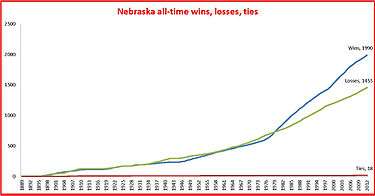
Nebraska's baseball program has experienced an impressive turnaround since the turn of the century. In 2000, after years as a perennial doormat, Nebraska advanced to a Super Regional in the NCAA Tournament for the first time in school history. In the following two seasons, the Huskers made their first and second appearances in the College World Series, held annually in nearby Omaha. Much of this success can be attributed to the efforts of head coach Dave Van Horn, who compiled an overall record of 214–92 from 1998 to 2002. After the 2002 season, Van Horn left to accept a position at his alma mater, Arkansas, and assistant coach Mike Anderson was named head coach.
Despite major success early in his tenure, including a College World Series appearance and school-record 57 wins in 2005, Anderson's program quickly went downhill and ended with his firing following the 2011 season. He was replaced by former Cornhuskers and major league All Star Darin Erstad. Through six seasons, Erstad's teams have never won more than a single game in the NCAA Tournament, but did win the program's first conference title in 12 years in 2017.
In 2002, the Huskers moved from the aging Buck Beltzer Stadium to Hawks Field at Haymarket Park, widely considered one of the best collegiate baseball facilities in the country. Nebraska has been in the top 30 for average attendance every year since the move to Hawks Field.
- Conference championships (7): 1929, 1948, 1950, 2001, 2003, 2005, 2017
- Conference tournament championships (4): 1999–2001, 2005
- NCAA Tournament appearances (17): 1948, 1950, 1979, 1980, 1985, 1999–2003, 2005–08, 2014, 2016, 2017
- College World Series appearances (3): 2001, 2002, 2005
Beach volleyball
Nebraska announced on January 9, 2013 that it would add beach volleyball as the school's 22nd intercollegiate sport. The Huskers began play in the spring of 2013. In 2016, the NCAA began holding an officially sponsored beach volleyball tournament (previously the sport was run by the AVCA), but Nebraska did not attempt to qualify, feeling it didn't make sense from a logistical standpoint. Despite the sport's increasing popularity (55 teams now compete in Division I), Nebraska runs one of the only beach volleyball programs in the Midwest, and generally plays its entire season during a spring break trip to California and Hawaii. Nebraska's beach roster is composed entirely of players from its indoor program, and according to head coach John Cook, the school plans to use beach volleyball primarily as a training tool for indoor for the time being.
On March 8, 2017, Nebraska hosted Missouri Baptist at the Hawks Championship Center. The match was closed to the public because of space limitations, but was noteworthy as the first collegiate beach volleyball match to take place in the state of Nebraska. The Cornhuskers swept the Spartans 5–0.
Through five seasons of competition, Nebraska's overall record is 25–21.
Beach volleyball competes as an independent, making it one of only three programs at Nebraska not affiliated with the Big Ten.
Softball
Nebraska's softball program started in 1970, before it was an official NCAA sport. Since the NCAA sanctioned softball in 1983, the Cornhuskers have made eight appearances in the Women's College World Series, held annually in Oklahoma City, and won the tenth-most games of any program. Rhonda Revelle became the program's head coach in 1992, and since then she has won 937 games, more than any other coach in Nebraska athletics history. Revelle has won seven conference titles and was inducted into the National Fastpitch Coaches Association Hall of Fame in 2010.
- Conference championships (10): 1982, 1984–88, 1998, 2001, 2004, 2014
- Conference tournament championships (9): 1982, 1984–88, 1998, 2000, 2004
- NCAA Tournament appearances (25): 1982, 1984, 1985 (vacated), 1987, 1988, 1995–2007, 2009–11, 2013–16
- Women's College World Series appearances (8): 1982, 1984, 1985 (vacated), 1987, 1988, 1998, 2002, 2013
Club sports
The University of Nebraska–Lincoln runs club programs for the following sports: badminton, barbell, baseball, bowling, broomball, climbing, crew, curling, cycling, dodgeball, golf, men's hockey, women's hockey, judo, men's lacrosse, women's lacrosse, rifle, men's rugby, women's rugby, runners, men's soccer, women's soccer, softball, sport officials, swim, table tennis, taekwondo, tennis, men's ultimate Frisbee, women's ultimate Frisbee, men's volleyball, women's volleyball, water polo, and water ski.
Athletic facilities

Home venues
| Sport | Home venue | Built | Location |
|---|---|---|---|
| Baseball | Hawks Field | 2001 | Off campus |
| Basketball | Pinnacle Bank Arena | 2013 | Off campus |
| Beach volleyball | Hawks Championship Center | 2006 | City campus |
| Bowling | East Campus Bowling Lanes | 1977 | East campus |
| Cross country | Pioneers Park Nature Center | 1963 | Off campus |
| Football | Memorial Stadium | 1923 | City campus |
| Golf | Wilderness Ridge Golf Club | 2001 | Off campus |
| Gymnastics | Bob Devaney Sports Center | 1976 | City campus |
| Ice Hockey (non-varsity) | John Breslow Ice Hockey Center | 2015 | Off campus |
| Rifle | Military and Naval Science Building | 1947 | City campus |
| Soccer | Barbara Hibner Soccer Stadium | 2015 | Off campus |
| Softball | Bowlin Stadium | 2001 | Off campus |
| Swimming & Diving | Bob Devaney Sports Center | 1976 | City campus |
| Tennis | Sid and Hazel Dillon Tennis Center | 2015 | Off campus |
| Track & Field | Bob Devaney Sports Center Ed Weir Stadium |
1976 1975 |
City campus City campus |
| Volleyball | Bob Devaney Sports Center | 1976 | City campus |
| Wrestling | Bob Devaney Sports Center | 1976 | City campus |
Additional facilities
| Venue | Purpose | Built | Location |
|---|---|---|---|
| Cook Pavilion | Student recreation center | 1987 | City campus |
| Hawks Championship Center | Football practice facility | 2006 | City campus |
| Osborne Athletic Complex | Athletic administration Athletic health and medicine Conditioning Strength training |
2006 | City campus |
| Nebraska Coliseum | Basketball (former home venue) Volleyball (former home venue) Wrestling (former home venue) Student recreation |
1926 | City campus |
| Recreation and Wellness Center | Student recreation center | 1926 | East campus |
| 17th & Vine Outdoor Complex 14th & Avery Outdoor Complex Fleming Fields |
Student recreation | N/A | City campus City campus East campus |
Mascots
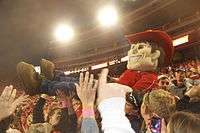
Herbie Husker – Herbie Husker first appeared in 1974 and has gone through major changes since, most recently in 2003 to update the overall appearance of the state's agricultural workers and general public. This particular alteration has proved to be incredibly unpopular among fans, who cite the new mascot's boring appearance as evidence in favor of the old mascot and its unique design. Herbie was named National Mascot of the year for the 2005 football season.
Lil' Red – Lil' Red was created before the 1993 season to appeal to younger fans. He was the national champion at the NCA National Mascot Competition in 1999 and was introduced into the Mascot Hall of Fame in 2007.[15]
Prior to Herbie Husker and Lil' Red, Nebraska cycled through a variety of mascots. Corn Cob appeared in the 1940s and 1950s with a corn cob head and green body. Both Husker Man and Mr. Cornhead were used throughout the 1960s. Harry Husker, the predecessor to Herbie, was the school's official mascot from 1965 to 1973.[16][17]
Fans
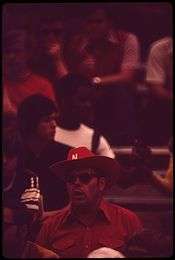
Decades of high attendance and well-traveling crowds across all sports have earned Nebraska fans a reputation for being fiercely loyal and dedicated. The school's athletic department proclaimed their fans "The greatest fans in college football" in an inscription above each of the 24 gates at Memorial Stadium.[8][18] In 2001, President George W. Bush stated that he "can't go without saying how impressed I am by the Nebraska fan base. Whether it be for women's volleyball or football, there's nothing like the Big Red."[19]
Memorial Stadium is sometimes referred to as The Sea of Red due to the home crowd's propensity to wear a certain color. Nebraska has sold out every home football game since November 3, 1962, 361 in a row, the longest sellout streak in college athletics.[20] Cornhuskers fans are noted for applauding the visiting team as they leave the field at the end of the game.[21] Nebraska fans are regarded as some of the best-traveling fans in the country. The most notorious example of this took place when Nebraska traveled to play Notre Dame in 2000. An estimated 35,000 people were wearing red at Notre Dame Stadium as no. 1 Nebraska beat no. 25 Notre Dame in overtime.[22][23]
Nebraska volleyball has sold out 236 consecutive matches between the Nebraska Coliseum and Devaney Center, the longest streak of its kind in women's college sports. The Cornhuskers have led the country in attendance for five straight seasons, and have played in eight of the ten highest-attended volleyball matches ever played. Nebraska's 3-1 victory over Florida in the 2017 national championship match set a new record with 18,516 fans in attendance, most of them in red.
Academic success
Nebraska has produced more total and football academic All-Americans than any other school . Through the 2016–17 academic year, the school has had 330 academic All-Americans across all sports.[24][25]
| Most Division I academic All-Americans | ||||||||||||||||||||||
|---|---|---|---|---|---|---|---|---|---|---|---|---|---|---|---|---|---|---|---|---|---|---|
| 1 | Nebraska | 330 | ||||||||||||||||||||
| 2 | Notre Dame | 257 | ||||||||||||||||||||
| 3 | Stanford | 216 | ||||||||||||||||||||
| 4 | Penn State | 200 | ||||||||||||||||||||
| 5 | Alabama | 161 | ||||||||||||||||||||
| 6 | Florida | 144 | ||||||||||||||||||||
| 7 | Michigan | 137 | ||||||||||||||||||||
| Minnesota | 137 | |||||||||||||||||||||
| 9 | Georgia | 136 | ||||||||||||||||||||
| Texas | 136 | |||||||||||||||||||||
References
- ↑ "University of Nebraska Athletics Brand Guide" (PDF). Retrieved December 24, 2017.
- ↑ Fricke, Mark (2005). Nebraska Cornhusker Football. Arcadia Publishing. p. 17. ISBN 9780738534374.
- ↑ McHugh, Jolene (November 19, 2011). "From the archives: The Cornhuskers". omaha.com. Archived from the original on October 26, 2016. Retrieved October 26, 2016.
- ↑ Fricke, Mark. "Nebraska Football In The 1890s" (PDF). library.la84.org. p. 11. Archived from the original on October 26, 2016. Retrieved October 26, 2016.
- ↑ "Origin of the Cornhusker Nickname – Huskers.com – Nebraska Athletics Official Web Site". Huskers.com. Retrieved 2015-12-04.
- ↑ "Husker Press Box – The Beginning Of The Huskers". May 11, 2008. Archived from the original on May 11, 2008. Retrieved October 8, 2017.
- ↑ Christopherson, Brian (June 20, 2009). "Deep Red: The story behind the name 'Cornhuskers'". journalstar.com. Archived from the original on October 26, 2016. Retrieved October 26, 2016.
- 1 2 "Past Division I Football Bowl Subdivision (Division I FBS) National Champions (formerly called Division I-A)". ncaa.org. National Collegiate Athletic Association (NCAA). 2007. Archived from the original on February 24, 2007. Retrieved March 10, 2007.
- ↑ "Nebraska volleyball history". NU Athletics. Retrieved August 1, 2008.
- ↑ "Omaha breaks NCAA ticket sales mark". NU Athletics. December 7, 2005. Retrieved August 1, 2008.
- ↑ "Huskers Sweep Bears, 3–0". NU Athletics.
- ↑ "Nebraska Coliseum". NU athletics.
- ↑ ESPN, ed. (2009). ESPN College Basketball Encyclopedia: The Complete History of the Men's Game. New York: ESPN Books. pp. 529–30. ISBN 978-0-345-51392-2.
- ↑ "The Leader". Nebraska-Omaha University. Retrieved 2014-01-01.
- ↑ "Spirit Squad". Huskers.com.
- ↑ "Nebraska Cornhusker Mascots and Logos". HuskerJ.com.
- ↑ "Pick of the Week". Retro Brand. September 16, 2009. Archived from the original on December 12, 2013.
- ↑ "Greatest Fans in College Football". Retrieved October 8, 2017.
- ↑ "President Bush Welcomes University of Nebraska Volleyball Champions to the White House". georgewbush-whitehouse.archives.gov. Retrieved October 8, 2017.
- ↑ "Road Trip". CNN. Retrieved May 20, 2010.
- ↑ "MSNBC — Breaking News, Top Stories, & Show Clips". MSNBC. Retrieved October 8, 2017.
- ↑ "Cotton Bowl News -Sports News -Dallas Morning News -News for Dallas, Texas". Retrieved October 8, 2017.
- ↑ "Three and out". CNN. November 30, 2004. Retrieved May 20, 2010.
- ↑ "CoSIDA Academic All-Americans". Nebraska Huskers.
- ↑ "Nebraska's Major Academic Awards". Nebraska Huskers. Retrieved 2012-01-01.
